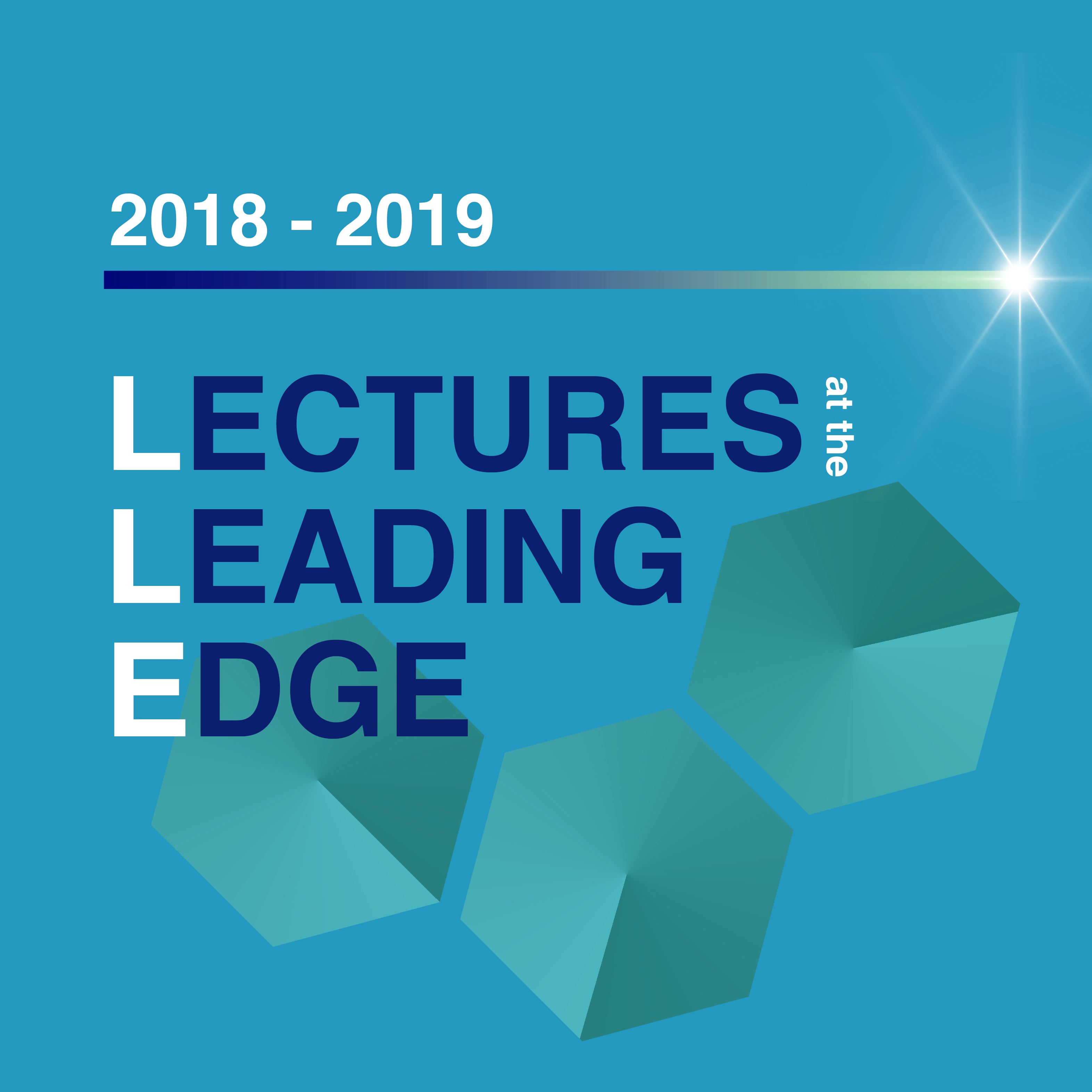 Co-hosted with the Institute for Water Innovation (IWI)
Co-hosted with the Institute for Water Innovation (IWI)
JOHN LIENHARD
Massachusetts Institute of Technology
THERMODYNAMICS AND TRANSPORT IN DESALINATIONSYSTEMS ENGINEERING
The world’s renewable fresh water supply may be considered to be the difference between precipitation over land and evaporation; and this supply is essentially fixed while world population has risen sharply and the water demands of growing economies continue to rise. As a result, water scarcity is an increasing problem throughout the world, with water shortages impacting both rural and urban populations and with substantial environmental damage as a result of water diversions for human use.
Desalination has been deployed worldwide to expand the supply of freshwater, especially for coastal populations, and its use has increased rapidly, with roughly 90 million m3/day of capacity now installed. The cost and lifetime of plants has also improved steadily. But concerns remain about the energy consumption and costs of desalination. In this talk, we will discuss research directed at understanding the causes of energy inefficiency in various desalination processes and efforts to adapt concepts from thermal systems engineering to improve the design of both thermal and membrane desalination systems. Topics to be discussed include thermodynamic and heat and mass transfer phenomena in various desalination technologies, with examples drawn from reverse osmosis, humidification-dehumidification, forward osmosis, membrane distillation, and the remediation wastewater from oil and gas production. Prospects for renewable energy integration will also be considered.
______________________________________________________
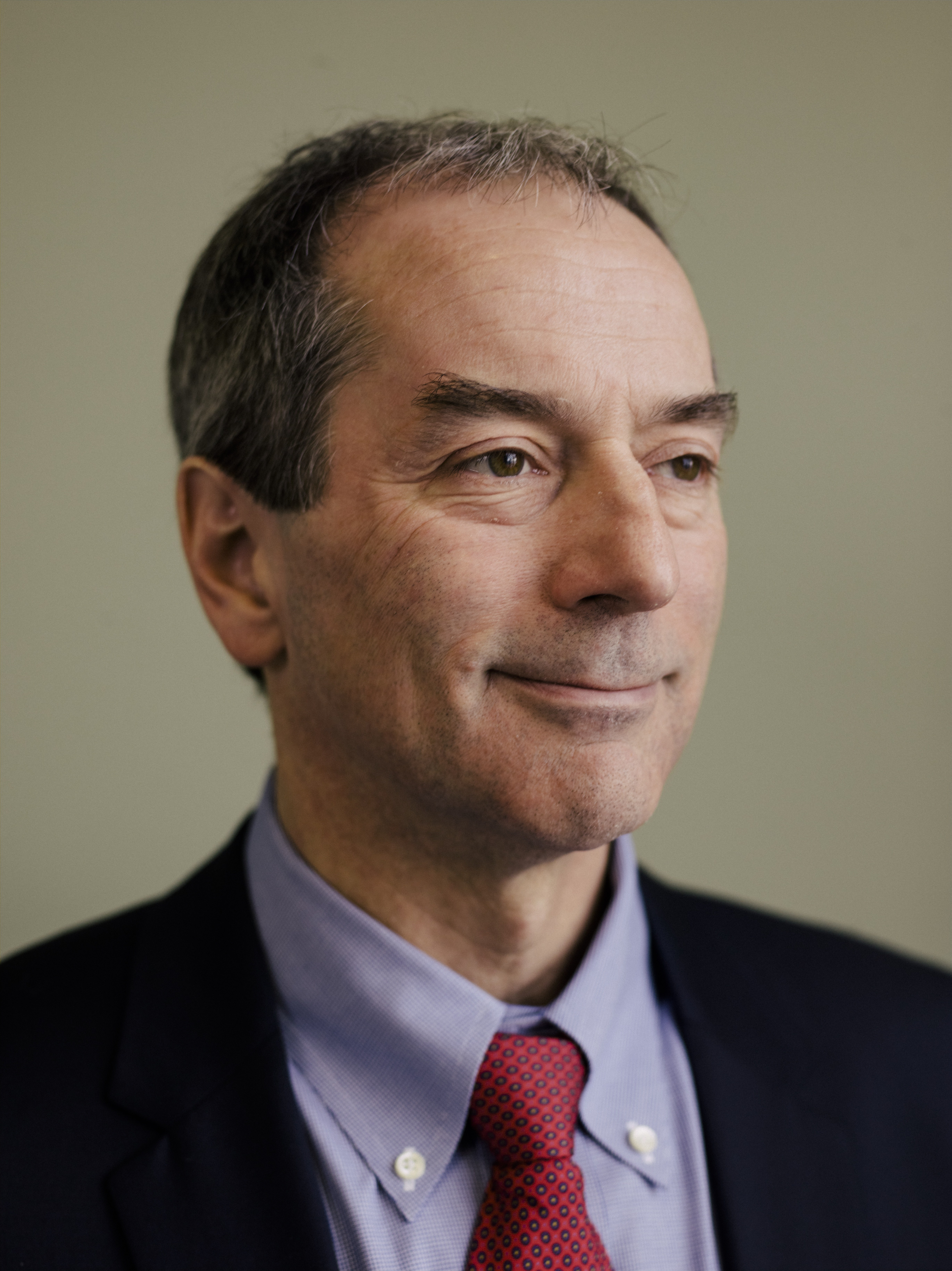
JOHN LIENHARD is the Abdul Latif Jameel Professor of Water at MIT. During three decades on the MIT faculty,Lienhard’s research and educational efforts have focused on heat and mass transfer, water purification and desalination, and thermodynamics. Lienhard received his bachelors and masters degrees in thermal engineering at UCLA from the Chemical, Nuclear, and Thermal Engineering Department. He joined MIT immediately after completing his PhD in the Applied Mechanics and Engineering Science Department at UC SanDiego. Lienhard’s research on desalination has included humidification-dehumidification, membrane distillation, forward and reverse osmosis, nanofiltration, electrodialysis, management of high salinity brines, fouling, energy efficiency, and remediation of wastewater from oil/gas operations. Lienhard has directly supervised more than 85 graduate theses and postdoctoral associates, and he is the author of 200 peer-reviewed publications and three textbooks. In addition, he holds more than 40 US Patents and pending applications, many of which have been commercialized in the water industry. Lienhard is a recipient of the 2012 ASME Globalization Medal and the 2015 ASME Heat Transfer Memorial Award. Lienhard and his students have received thirteen best paper and poster awards for their desalination research over the past seven years.
Download the lecture poster HERE
For more information on Lectures at the Leading Edge 2018-19 click HERE

Wednesday, January 30th is Bell Let’s Talk Day; a charitable program dedicated to the promotion, support, and destigmatization of mental health across Canada. The Department of Chemical Engineering & Applied Chemistry will be participating in this event by hosting drop-in mental health and de-stress activities in WB116 from 12pm-2pm, including:
- Photo station – Bell will donate 5 cents per photo we post with their filter or hashtag
- Mindful cookie eating
- Conflict corner – chat about grad student problems facilitated by a rep from the Conflict Resolution Centre
- Mental health mural and colouring station
- Free pizza upon participating in 1 of the activities
Other ways to participate:
- Post from your facebook/twitter/instagram/snapchat with the Bell Let’s Talk filter or #BellLetsTalk (we will have reps around the building to take pictures too)
- If Bell is your phone service provider, send a text or make a call
- Watch videos on their website
- Talk about it! This is the best way to promote awareness and destigmatize mental health issues
Any questions or concerns can be directed to: cegsa.chemeng@gmail.com
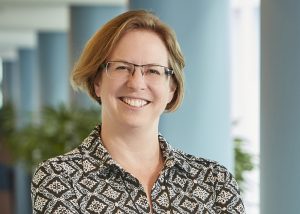 Emily Moore
Emily Moore
Director, Troost Institute for Leadership Education in Engineering (ILead)
Mine water treatment is a complex challenge which requires a combination of specialist chemical engineering knowledge with an integrated, multi-disciplinary approach. Tightening legislative requirements and emerging contaminants present new challenges which are driving more sites to tertiary water treatment systems. While new technologies show promise, there are considerable challenges to implementation resulting in significant operating and capital costs. Integrated water management (IWM) is a holistic approach to minimizing water use and contamination across the entire site, and when implemented well can reduce treatment requirements and costs. IWM presents a wonderful teaching opportunity for context-based decision making and introducing environmental considerations.
_____________________________________
Emily Moore is the new Director of the Troost Institute for Leadership Education in Engineering (ILead), joining UofT after over 20 years in industry. Emily spent the first half of her career at the Xerox Research Center of Canada (XRCC) in scale-up engineering, then in 2008 joined Hatch Limited as director of technology development, later serving as managing director for water and for innovation. In 2011 Emily was elected president of the Canadian Society for Chemical Engineering and has served on numerous committees of the Natural Sciences and Engineering Research Council of Canada. Her leadership in industry has been recognized by the Society for Chemical Industry Canada, and by Women in Mining, who named her one of 100 Global Inspirational Women in Mining 2016.
Emily earned a bachelor’s degree in engineering chemistry from Queen’s University and is a licensed professional engineer. She was named a Rhodes Scholar and completed her doctorate in physical chemistry at Oxford University.
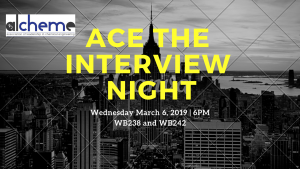 The Association for Leadership in Chemical Engineering (AlChemE) will be holding its annual Ace the Interview Night on Wednesday, March 6, 2019 at 6 pm in WB 238.
The Association for Leadership in Chemical Engineering (AlChemE) will be holding its annual Ace the Interview Night on Wednesday, March 6, 2019 at 6 pm in WB 238.
The annual “Ace the Interview Event” which provides undergraduate students with the confidence and interview experience to help them succeed in their search for PEY, summer and post-graduate job opportunities.
As in previous years, we will present 5 mock jobs to students who will then choose to apply to one of them. They will create a resume and cover letter for this job and we will send it to you for review before the interview date. We will also provide you with the mock job descriptions of the students you will be interviewing so you can prepare interview questions beforehand.
Please respond as soon as possible to the google form posted below to participate in this alumni outreach/mentorship event.
https://docs.google.com/forms/d/e/1FAIpQLSfTRSgNjlpxNdyrJWpKd8ibSwcxdxVeh9SCjpPT44pHzYdsKQ/viewform
If you have any questions about the event, feel free to email us at z.gao@mail.utoronto.ca or purushoth.thavendran@mail.utoronto.ca.
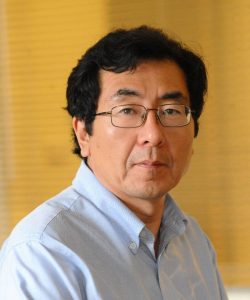 Emission of CO2, a byproduct from many industrial processes and power plants, has increased with increasing energy demand and growing population. Most of the efforts to chemically reduce CO2 requires the use of H2. This is not desirable because at present ~95% of H2 is generated from hydrocarbon-based feedstock, producing CO2 as a byproduct. In this talk we will first give a brief summary on CO2 conversion by H2, followed by discussing our recent efforts in converting CO2 by light alkanes, such as ethane, via the dry reforming pathway to produce synthesis gas (C2H6 + 2CO2 → 4CO + 3H2) or the oxidative dehydrogenation route to generate ethylene (C2H6 + CO2 → C2H4 + CO + H2O). Using a combination of kinetic studies, in situ characterization and DFT calculations, we have identified several classes of catalysts that can activate both CO2 and light alkanes (C2-C4) to achieve selective dry reforming or oxidative dehydrogenation. Finally, we will discuss potentially reducing CO2 emission by alternative pathways for N2 transformations, which are currently the most CO2-emitting chemical processes.
Emission of CO2, a byproduct from many industrial processes and power plants, has increased with increasing energy demand and growing population. Most of the efforts to chemically reduce CO2 requires the use of H2. This is not desirable because at present ~95% of H2 is generated from hydrocarbon-based feedstock, producing CO2 as a byproduct. In this talk we will first give a brief summary on CO2 conversion by H2, followed by discussing our recent efforts in converting CO2 by light alkanes, such as ethane, via the dry reforming pathway to produce synthesis gas (C2H6 + 2CO2 → 4CO + 3H2) or the oxidative dehydrogenation route to generate ethylene (C2H6 + CO2 → C2H4 + CO + H2O). Using a combination of kinetic studies, in situ characterization and DFT calculations, we have identified several classes of catalysts that can activate both CO2 and light alkanes (C2-C4) to achieve selective dry reforming or oxidative dehydrogenation. Finally, we will discuss potentially reducing CO2 emission by alternative pathways for N2 transformations, which are currently the most CO2-emitting chemical processes.
___________________________________
Jingguang Chen is the Thayer Lindsley Professor of chemical engineering at Columbia University, with a joint appointment as a senior chemist at Brookhaven National Laboratory. He received his BS degree from Nanjing University and PhD degree from the University of Pittsburgh. He then carried out his Alexander von Humboldt postdoctoral research in KFA-Julich in Germany. After spending several years as a staff scientist at Exxon Corporate Research Laboratories, he started his academic career at the University of Delaware in 1998 and rose to the rank of the Claire LeClaire Professor of
chemical engineering and the Director of the Center for Catalytic Science and Technology. He moved to Columbia University in 2012. He is the co-author of 23 United States patents and over 380 journal
publications that have been cited over 25,000 times. He is currently the President of the North American Catalysis Society and an Associate Editor of ACS Catalysis. He received many catalysis awards, including the 2015 George Olah award from the American Chemical Society and the 2017 Robert Burwell Lectureship from the North American Catalysis Society.

Co-hosted with the Ontario Centre for the Characterisation of Advanced Materials (OCCAM)
IAN GILMORE
National Physical Laboratory, UK
Metabolic Imaging at the Single-Cell Scale: Recent Advances and Future Challenges in Mass Spectrometry Imaging
Super-resolution optical microscopy using fluorescent labels has been transformational in allowing the machinery of life, e.g. proteins, to be seen at the nanoscale. There is a great desire in the life-sciences to achieve this level of insight for metabolites. This will allow unprecedented ability to understand rewiring of metabolic networks involved in disease, understanding of the uptake of drugs in cells and construct mechanistic understanding in fundamental biology. However, this is a monumental challenge since fluorescent labelling strategies cannot be used because of the dynamic processes in the creation of metabolites and because the fluorescent labels themselves radically alter the chemistry of the metabolite.
Mass spectrometry allows label-free (or with stable isotope labelling) identification of endogenous and exogenous (e.g drugs) metabolites and when combined with high-resolution ion beams in secondary ion mass spectrometry (SIMS) allows sub-cellular resolution imaging. Substantial barriers need to be overcome to achieve a super-resolution goal (< 250 nm) including increasing sensitivity, increasing specificity (accurate identification of molecules), sample preparation methodologies (e.g. cryo-SIMS) and improvements in ion beam resolution. This lecture will review our research at NiCE-MSI using three SIMS instrument types; ToF-SIMS, 3D OrbiSIMS and a CAMECA NanoSIMS 50L and place this in context with complementary methods such as AP-SMALDI.
Many metabolites are of low mass (e.g. dopamine) and are in a highly congested region of the mass spectrum. Here, ToF-SIMS is inadequate to resolve the peaks especially at high-spatial resolution. We have led the development of a powerful new hybrid instrument, the 3D OrbiSIMS, combining an OrbitrapTM-based Thermo ScientificTM Q ExactiveTM HF instrument and a dedicated ToF-SIMS 5. The instrument is equipped with high-resolution ion beams including a new micron resolution argon cluster ion beam for biomolecular imaging and 3D analysis of organics and an ultra-high resolution Bi cluster focussed ion beam with < 100 nm resolution. We demonstrate the unparalleled ability for 2D and 3D metabolite imaging with sub-cellular resolution.
For imaging at the organelle scale, e.g. mitochondria and lysosomes, then a resolution of 50 nm or better is needed. This is achieved with the CAMECA NanoSIMS 50L. Normally, the solvent based sample preparation procedures used wash out drug molecules. We have developed a method that traps molecules within the organelles and use this to demonstrate the first direct evidence of drug induced phospholipidosis caused by amiodarone uptake in rat alveolar macrophages.
_______________________________________________
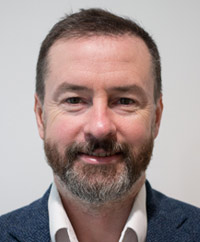 IAN GILMORE is a Senior NPL Fellow in Surface & Nanoanalysis and a Visiting Professor in the School of Pharmacy at the University of Nottingham.
IAN GILMORE is a Senior NPL Fellow in Surface & Nanoanalysis and a Visiting Professor in the School of Pharmacy at the University of Nottingham.
His research focus is on the analysis of molecules at surfaces and interfaces in a wide range of sciences, including the intracellular distribution of pharmaceuticals, drug delivery systems, medical devices, organic electronics and devices using 2D materials.
Ian has recently launched a UK National Centre of Excellence in Mass Spectrometry Imaging (NiCE-MSI). This world-class centre has over 15 staff scientists who are experts in the three principal techniques: secondary ion mass spectrometry (SIMS); ambient mass spectrometries (AMS); and matrix assisted laser desorption ionisation (MALDI MS).
The aims of NiCE-MSI are to advance the fundamentals of the techniques and innovate measurement capabilities; establish metrology for reliability and standardisation; and support the uptake of the techniques in industry and academia. For example, Ian is leading a major new project, 3D nanoSIMS, in collaboration with GlaxoSmithKline, to create the next generation SIMS instrument for label-free imaging of drugs in cells with a spatial resolution at the organelle scale.
He has authored and co-authored over 100 papers on surface analysis and co-edited the popular teaching book ‘Surface Analysis – The Principal Techniques’.
Ian is a Fellow of the Institute of Physics (UK) and was awarded the Institute’s Paterson Medal (2004) for his innovation of G-SIMS. He is a Fellow of the American Vacuum Society, a major science and technology society in the USA, and served on the Board of Directors in 2013-14 where he led the development of the Society’s strategy.
Ian has made a major contribution to international leadership in surface analysis, recognised by the Rivière Prize in 2013 from the UK Surface Analysis Forum. He is chair of the International SIMS conference series and is chairing a Royal Society Scientific Meeting on Mass Spectrometry Imaging in 2015. He has previously successfully co-chaired the SIMS XV international conference (Manchester, 2005) and chaired the IUVSTA workshop on sputtering and ion emission by cluster ion beams (Scotland, 2007).
Ian provides leadership in international standardisation through chairing the committee for SIMS in ISO TC 201 and he is chair of VAMAS for surface chemical analysis, which conducts interlaboratory studies in electron spectroscopies, scanning probe microscopies and mass spectrometries to advance the techniques, support uptake into industry and standardisation.
Download the lecture poster HERE
For more information on Lectures at the Leading Edge 2018-19 click HERE
Topics for discussion:
1. Courses
2. financial literacy
3. general feedback
Is there a need for financial literacy seminars? What’s missing from ChemE’s curriculum? What are the main obstacles standing in the way of completing your research? What other issues should we be focusing on?
HAVE YOUR SAY AND EAT FOR FREE!

ALFRED SPORMANN
Stanford University
Microbial Electrosynthesis for a Carbon-Neutral Energy and Chemicals Economy
Microbial electrosynthesis is a recently discovered and investigated process, where certain microbes take up electrons from a cathode and use those as catabolic electrons for CO2 reduction reaction. Depending on the choice of microorganism, either methane (electromethanogenesis), or C4-6 organic compounds can be produced at high selectivity and rate. This process provides an important novel use of biology for either converting electricity into carbon-neutral natural gas, or for producing carbon-neutral chemicals from CO2 and electricity. The potentials and research needs for further developing of this new technology will be discussed.
__________________________________________
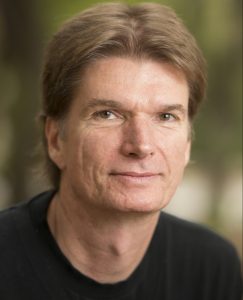
Alfred Spormann is Professor of Civil and Environmental Engineering, of Chemical Engineering and, by courtesy, of Biology at Stanford University. He received his Ph.D. from the Philipps-University, Marburg, and conducted postdoctoral research at the Departments of Biochemistry at the University of Minnesota, Minneapolis, and at Stanford University.
Alfred’s research investigates molecular microbial metabolism and its linkage to ecological and evolutionary processes, exploring the distinguishing features of novel microbial metabolism and how molecular and biochemical differences in metabolism shape microbial fitness. His primary research interests include the study of novel microbial metabolism with relevance to bioremediation, bioenergy, and intestinal microbiology.
For more information on Lectures at the Leading Edge 2018-19 click HERE.
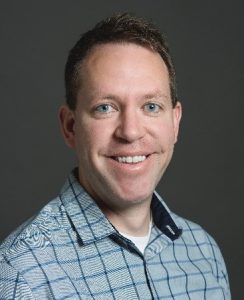 Dr. Shawn Owen (Department of Pharmaceutics and Pharmaceutical Chemistry – University of Utah)
Dr. Shawn Owen (Department of Pharmaceutics and Pharmaceutical Chemistry – University of Utah)
Antibodies are important biological scaffolds used in biotherapeutics and diagnostics. The utility of antibodies can be expanded by coupling them with small-molecule drugs or proteins. Using both protein engineering and bioconjugation chemistry, we have created a series of highly-characterized antibody-conjugates that simultaneously deliver multiple drugs to induce new forms of synthetic lethality. Using these platforms, we are able to significantly increase the amount of drug that reaches a therapeutic target and demonstrate the applicability against HER2 positive cancers, as well as, drug-resistant bacteria. In separate approaches, we are utilizing split-enzyme technology to construct a new class of antibody-mediated diagnostics. These ‘wash-free’ homogenous immunoassays are as sensitive and more rapid than current technologies, without cumbersome processing steps. We have successfully constructed assays to measure protein biomarkers to follow cancer treatment and assays to monitor therapeutic drug levels. We are currently applying our platform to investigate important protein-protein interactions.
———————————————————————–
Shawn C. Owen, Ph.D is an Assistant Professor in Pharmaceutics and
Pharmaceutical Chemistry and Adjunct Professor of Internal Medicine at the University of Utah. He is also a member of the Huntsman Cancer Institute Experimental Therapeutics Program and the Nano-Institute of Utah. Owen’s research focuses on evaluating the pharmaceutic stability of antibody-based therapeutics, creating ADCs that induce self-amplifying therapeutic cascades, and engineering antibody-split enzyme systems for diagnostic applications. He has published ~25 research papers on biotechnology and his research has produced 4 patent applications. Owen is recognized with several prominent university teaching awards and is sought for outreach workshops by both academia and industry sponsors.
Hosted by Dr. Molly Shoichet. Snacks and Refreshments will be served

Co-hosted with the Institute for Studies in Transdisciplinary Engineering Education and Practice (ISTEP)
JENNIFER CASE
Virginia Tech
GOING BEYOND THE FADS AND JARGON: WHAT DOES RESEARCH TELL US ABOUT TEACHING FOR HIGH QUALITY LEARNING IN SCIENCE AND ENGINEERING?
There is much contemporary talk on how university teaching is outdated, and how radical change is needed to accommodate the needs of current students and the expectations of the workplace. Many of these calls, whether for active or problem-based learning fall into a longer and broader tradition of progressivism in education. To interrogate their applicability, a carefully formulated position is needed on knowledge and learning in science and engineering. In this talk, Jenni Case draws on contemporary research in engineering education to consider the nature of knowledge in the curriculum, and what we know about learning challenges in these fields, and how teaching can best support high quality learning outcomes.
__________________________________
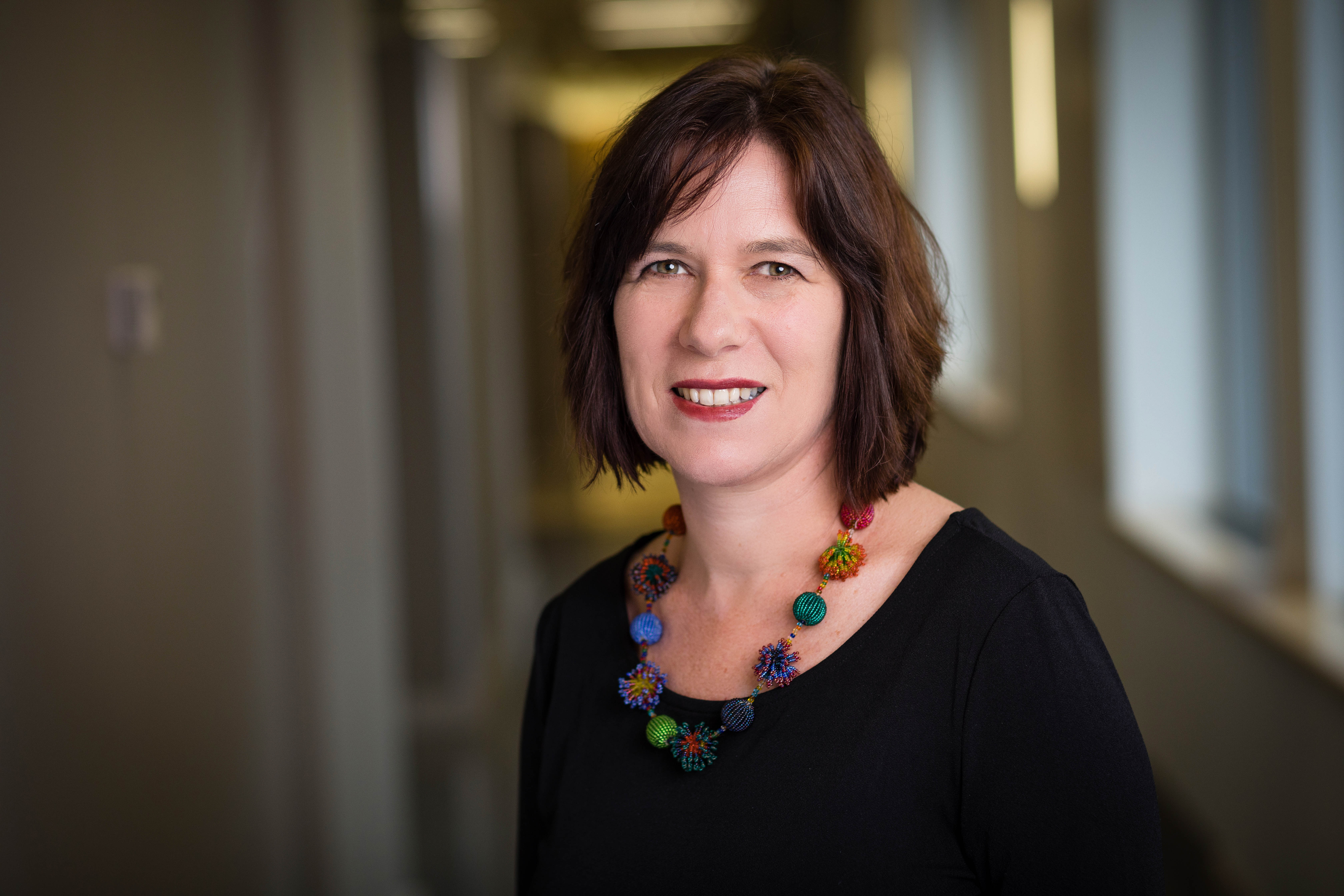 JENNIFER CASE is Professor and Head of the Department of Engineering Education at Virginia Tech. Prior to her appointment in this post she was Professor in the Department of Chemical Engineering at the University of Cape Town, South Africa, where she retains an honorary appointment. She completed postgraduate studies in the UK, Australia and South Africa. With more than two decades of undergraduate teaching and curriculum reform work, she is also a renowned researcher in engineering education and higher education. Her work especially on the student experience of learning as well as on topics around teaching and curriculum, has been widely published. She was the founding president of the South African Society for Engineering Education (SASEE). She is a coordinating editor for the international journal Higher Education and a co-editor for the Routledge/SRHE series Research into Higher Education.
JENNIFER CASE is Professor and Head of the Department of Engineering Education at Virginia Tech. Prior to her appointment in this post she was Professor in the Department of Chemical Engineering at the University of Cape Town, South Africa, where she retains an honorary appointment. She completed postgraduate studies in the UK, Australia and South Africa. With more than two decades of undergraduate teaching and curriculum reform work, she is also a renowned researcher in engineering education and higher education. Her work especially on the student experience of learning as well as on topics around teaching and curriculum, has been widely published. She was the founding president of the South African Society for Engineering Education (SASEE). She is a coordinating editor for the international journal Higher Education and a co-editor for the Routledge/SRHE series Research into Higher Education.
Download the lecture poster HERE
For more information on Lectures at the Leading Edge 2018-19 click HERE
 Emily Moore
Emily Moore